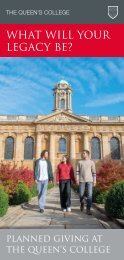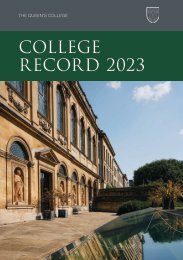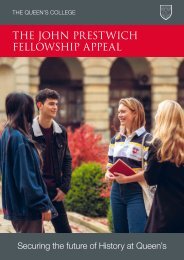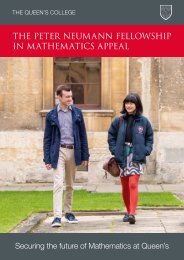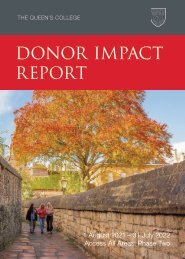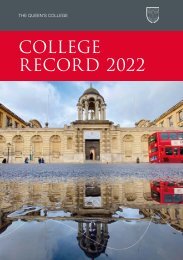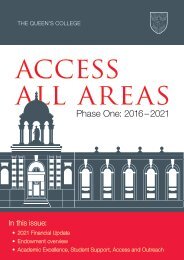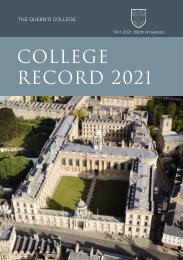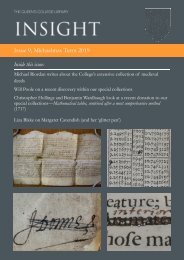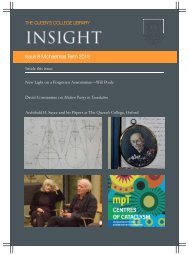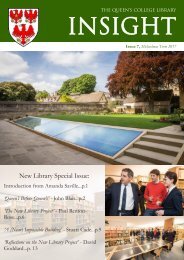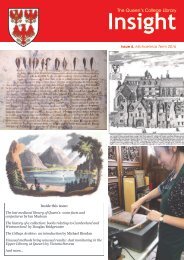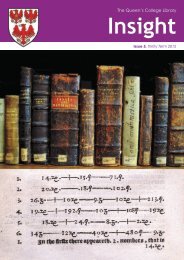Eagle Eye Magazine Issue 1 2023
Take a dive into the research and work that's going on at The Queen's College and beyond its walls within the community of Old Members. In issue one, we celebrate Shakespeare's First Folio, ask our history Fellows what makes them passionate about their subject, explore the new accessible Porters' Lodge, ask a current student about how to engage positively with climate issues, and much more.
Take a dive into the research and work that's going on at The Queen's College and beyond its walls within the community of Old Members. In issue one, we celebrate Shakespeare's First Folio, ask our history Fellows what makes them passionate about their subject, explore the new accessible Porters' Lodge, ask a current student about how to engage positively with climate issues, and much more.
Create successful ePaper yourself
Turn your PDF publications into a flip-book with our unique Google optimized e-Paper software.
What motivated you to co-found The Earthly, a digital<br />
publication examining climate issues?<br />
The initial idea for a new climate-focused publication came<br />
from Joe Tester, a third-year Biologist at Magdalen College.<br />
I immediately jumped at the opportunity to get involved, and<br />
together we developed what is now The Earthly. We identified three<br />
key issues we wanted to tackle, and came up with our aims:<br />
‘optimistic, accessible, engaging’.<br />
Firstly, so much popular climate media is very ‘doom and gloom’,<br />
which often precedes the sentiment that ‘it’s too late’ or ‘there’s<br />
no point’ in fighting for action anymore (which is very much not<br />
true). While we are dealing with serious and heavy topics, we<br />
believe it is important to frame issues from a perspective which<br />
will motivate rather than demotivate, hence, ‘optimistic’.<br />
Secondly, a lot of climate writing is jargon-littered and difficult<br />
for any non-expert to understand. As well as this, research<br />
is often published in subscription-only journals, which are<br />
not publicly available. The climate and biodiversity crisis is<br />
something that will impact all of us, and so we wanted to create<br />
a space where anyone can access climate information, and be able<br />
to understand our articles without extensive prior knowledge.<br />
Hence, ‘accessible’.<br />
Thirdly, many articles dealing with climate issues are information<br />
dense and difficult to digest. We wanted to make our articles are<br />
short and as vibrant as they can be, hence, ‘engaging’.<br />
What’s your main goal with The Earthly?<br />
We post a regular flow of new articles with the aim to educate,<br />
and through this, to inspire change. Each article deals with<br />
a different climate-related topic, presenting an issue and<br />
discussing potential solutions.<br />
What do you think is the most<br />
important approach when dealing with<br />
issues of climate change?<br />
I think that we should attack issues with equal amounts of<br />
fervour and compassion. By fervour, I mean the urgency and<br />
agency required to push for immediate and permanent change. By<br />
compassion, I mean understanding the nuanced struggles that the<br />
non-human and human inhabitants of the planet will face as a<br />
result of the climate and biodiversity crisis and keeping empathy<br />
for this at the forefront of decision making.<br />
Significantly, I think problems will be best solved through<br />
collaboration, between researchers in diverse disciplines, policymakers,<br />
communities, and intergovernmental organisations.<br />
“I think problems will be best<br />
solved through collaboration<br />
How do you balance your degree work with working on<br />
the publication?<br />
This year I’ve shared the role of Editor-in-Chief with our Founder,<br />
Joe, which makes the workload a lot more manageable. We are a<br />
fairly small publication with a relatively large team – The Earthly<br />
really wouldn’t exist without the help of our committed editors.<br />
Also, as a Biology student, things I learn as part of my degree<br />
often inspire our articles, and in the same way, the research for<br />
articles supports my degree. The skills I have gained through The<br />
Earthly, in researching, writing, and organising, have been hugely<br />
beneficial to my academic life as well.<br />
How involved have other students at Queen’s been<br />
with The Earthly?<br />
We’ve had a really good amount of Queen’s involvement this<br />
year – with students studying subjects from Biology, to History &<br />
Politics, as well as Classics, becoming writers and editors.<br />
How can other students take part next term?<br />
We are always keen for new writers to take on commissions or<br />
pitch articles to us. We have already put together our editorial<br />
team for Michaelmas term, but we will be looking for new editors,<br />
illustrators, and a new Editor-in-chief for Hilary term. Anyone<br />
who is interested in getting involved in any way can drop us an<br />
email at editors@TheEarthly.co.uk.<br />
How important do you think local and individual measures<br />
are versus the endeavours of top researchers and policy-makers<br />
in the context of solving the world’s big problems?<br />
I think global problems require global solutions, but local efforts,<br />
if coordinated, can have huge positive benefits. Individual<br />
measures are important - I believe we<br />
all should do as much as we can to live<br />
more sustainable lifestyles. But critically,<br />
I think individual empowerment can drive<br />
community mobilisation, which can, in turn, encourage large-scale<br />
change from policy-makers, government, and industry.<br />
Scientific research is paramount: conversations about global<br />
problem-solving must be centred around scientific evidence.<br />
This is another pillar upon which The Earthly was founded – to be<br />
entirely scientific evidence-based.<br />
What’s your favourite place in Oxford?<br />
I really like the Botanic Gardens – students can go in for free, and<br />
there is a bench right by the river where I love to sit and read or<br />
just gather my thoughts.<br />
What are the most interesting things you have learned so far as<br />
a result of gathering content for The Earthly?<br />
I’ve come to realise how interconnected and intersectional the<br />
majority of climate and biodiversity issues are. The biosphere is<br />
just a series of complex interactions, so it is very difficult to deal<br />
with a single issue in isolation.<br />
Can you recommend a book?<br />
One of my favourite popular science books is Incredible Journeys by<br />
David Barrie. It describes the fascinating ways in which animals<br />
navigate. It’s actually the book that inspired me to apply for<br />
Biology at Oxford!<br />
27




